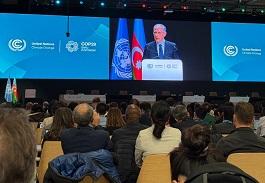By NBE
Copyright newbusinessethiopia

The Presidencies of the United Nations Convention to Combat Desertification (UNCCD) Conference of the Parties – COP16 (Kingdom of Saudi Arabia) and COP17 (Mongolia) – joined forces to sustain political momentum and financial engagement for global land restoration and drought resilience.
The joint high-level event, held on the sidelines of the UN General Assembly in New York, convened leaders, ministers, international organizations and private sector partners. Land degradation already affects up to 40 per cent of the world’s land, undermining food and water security and the livelihoods of nearly half of humanity.
The single largest driver of this degradation is unsustainable food systems, which account for most deforestation and biodiversity loss worldwide. Droughts –up by nearly one third since 2000– are hitting harder and more often across the globe. Few hazards claim more lives, cause greater economic loss, or affect more sectors of society than drought, which now inflicts more than USD 307 billion in damages each year. If trends continue, three in four people worldwide will be affected by 2050, with developing countries the hardest hit.
Yet, private sector contributions currently account for just 6 per cent of global financing in this space. Closing this gap is essential to translate political commitments into impact on the ground.
At COP16 in Riyadh in 2024, countries rallied around a new vision for resilience, launching the Riyadh Global Drought Resilience Partnership and mobilizing more than USD 12 billion in pledges.
Looking ahead, COP17 in Ulaanbaatar in 2026 will coincide with the International Year of Rangelands and Pastoralists, spotlighting ecosystems that sustain hundreds of millions of people and are central to climate stability. Rangelands cover more than half of the Earth’s surface, support the direct livelihoods of 500 million people and provide one-sixth of the world’s nutrition needs.
The COP16 and COP17 Presidencies stressed the importance of continuity, solidarity and ambition. Mr. Osama Faqeeha, Deputy Minister of Environment, Water and Agriculture of the Kingdom of Saudi Arabia, UNCCD COP16 Presidency, noted: “At COP16 in Riyadh, countries came together to launch a new vision for sustainable land management and to mobilize unprecedented commitments to combat desertification. Today we are building on that momentum, working hand in hand with Mongolia, UNCCD and partners around the world to ensure that these pledges translate into action that protects people, economies and ecosystems from the growing impacts of land degradation and drought.”
Echoing this spirit, H.E. Battsetseg Batmunkh, Minister of Foreign Affairs of Mongolia, emphasized: “This gathering is our attempt to build a bridge—one that connects our shared ambition to accelerate global action on desertification, land degradation, land restoration and drought resilience. As host of COP17, and as a nation with millennia knowledge living in harmony with nature, Mongolia embraces practices that enhance productivity while preserving ecosystems.”
She underscored Mongolia’s leadership in regenerative agriculture, sustainable grazing systems, nature-based solutions, and healthy soils.
Looking ahead, Minister Battsetseg emphasized the urgent need to rethink financing models. “Traditional investment instruments are no longer sufficient,” she stated. “We need results-based financial tools that reward measurable outcomes—whether restored rangelands, improved water retention, or reduced drought losses.”
Against this backdrop, the gathering in New York placed a strong emphasis on mobilizing finance and partnerships to scale up solutions –both building drought resilience and supporting pastoralist communities. The private sector is a critical partner in our journey towards drought resilience, providing investment, innovation, and the capacity to scale.
Speaking on behalf of the UNCCD Secretariat, Andrea Meza, Deputy Executive Secretary, highlighted the central role of land restoration and resilience: “Land restoration and drought resilience are not only environmental imperatives; they are building blocks of peace, prosperity, and sustainable development. Restoring rangelands, savannas, and farmlands strengthens food and water security. It creates jobs, supports pastoralists and farmers, and provides hope and dignity to communities on the frontlines of climate change. With the leadership of the COP16 and COP17 Presidencies, the Kingdom of Saudi Arabia and Mongolia, and the engagement of the private sector, we have a unique opportunity to scale solutions that protect our land, our climate, and our future.”
Participants also presented innovative financing mechanisms such as the Drought Resilience Investment Facility (DRIF), alongside blended finance, insurance models and bankable projects. International financial institutions, development banks and the private sector presented tangible solutions for land restoration and strengthening local economies. The DRIF, developed in partnership with Luxembourg, aims to mobilize private-sector investment for drought resilience.
Delivering the keynote address, André Hoffmann, Interim Co-Chair of the World Economic Forum, underlined the urgency of global collaboration: “Nature is not just another resource – it is the foundation of all prosperity. Droughts and land degradation are stark reminders that we have exceeded the limits of this natural capital. The path forward is a new nature of business: an economy where governments, companies and citizens join forces to restore land, safeguard water, and build lasting resilience. This is not only a moral imperative, but also a prerequisite for economic and social stability ‘
Closing the event, leaders reaffirmed that advancing land restoration and drought resilience is a global priority – key to securing food and water, strengthening local economies, and safeguarding the climate for generations to come.



